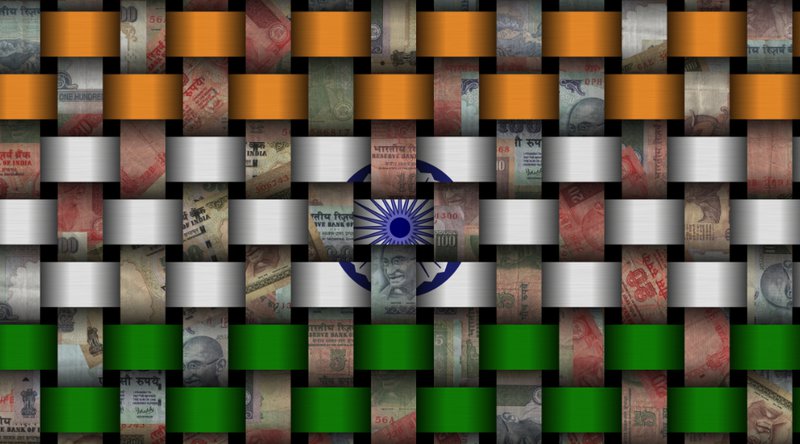Indian Government Turns Fiat Currency War on to Cryptocurrencies

The cryptocurrency marketplace in India is facing a siege from multiple parts of the government as several incidents amount to a buildup of the Narendra Modi–led government’s actions on regulating cryptocurrencies. If the reports out of India are true, the IMF’s “fastest growing country among emerging economies” may have to meet its 7.4 percent GDP growth target in 2018 without the boost that the digital currency industry has provided in the past.
The Prequel: PM Modi Demonetized Rs 500 and Rs 1000 Notes in 2016
Prime Minister Narendra Modi announced in late 2016 a “demonetization policy” in which the Rs 500 and Rs 1000 notes would no longer be considered “legal tender” as of November 9, 2016. The reasoning given for the move: curbing the impact of fake currency, “black money,” corruption and terrorism on the nation’s economy.
While the effectiveness of the campaign has been debated and politicized, the same reasoning the prime minister used on fiat currency bills is now being echoed about on the subject of cryptocurrency regulation.
Finance Minister Jaitley to Parliament: Cryptos Not “Legal Tender”
On January 2, 2018, Finance Minister Arun Jaitley answered questions before Indian parliament, in which he stated that “bitcoins or such cryptocurrencies are not legal tender and those indulging in such transactions are doing it at their own risk.”
Aman Kalra, marketing head of New Delhi–based Bitcoin exchange Coinsecure, stated:
If we listen to Mr. Jaitley’s comments carefully, we’ll notice that he never referred to bitcoin and other cryptocurrencies as illegal, and always mentioned that they are waiting for the report from the group that was formed for this purpose …
Kalra’s point is an oft-repeated one in the industry, that excluding cryptocurrencies as “legal tender” doesn’t necessarily make their trade and usage illegal. However, parliament member Muthuvel Kanimozhi asked the minister during Question Hour if the government would be seeking to regulate cryptocurrencies like bitcoin and ether given that India “accounts for more than 11 percent” of cryptocurrency trading globally.
While actions to regulate major cryptocurrency coins by Indian heads of state may concern outside investors, given India’s voluminous participation in the markets, Kalra indicated that “not calling it a legal tender doesn’t worry us [Coinsecure] at all. If the [government] had to ban it, they would have done it a long time ago.” Kalra also took the stance that the industry understands it takes time for the government to understand technology like Bitcoin “before coming out with regulations around it.”
Frozen Bank Accounts — Fake News?
On January 21, 2018, news reports from the Times of India indicated that several Indian banks (the State Bank of India, the ICICI, the HDFC Bank and Axis Bank) had frozen bank accounts associated with cryptocurrency trading. Users on Reddit debated the news with one user by the name of ubiquitous_raven, who stated (on reports inclusive of the frozen bank accounts notices):
This is why the nation can never ride the wave towards growth and be early adopters of world-changing tools/tech/ideas … I believe in the blockchain and its successors and have no intention to scare people out of cryptocurrency. But it is extremely agitating/saddening to watch the largest democracy in the world with the second largest population take steps towards the dark ages.
When asked about the topic, Kalra hinted at two words Americans have tired of hearing: “fake news.” According to Kalra, it appears there is “very little truth” to those news reports. Kalra went on to add, “I cannot comment upon other exchanges in India, but Coinsecure hasn’t been contacted for any such issues from its banking partners.” Some users on the /r/cryptocurrency subreddit agree with Kalra’s statement, noting the reports were either “clickbait” or referencing earlier actions, stating, “This is the explanation of the issue that happened with Zebpay and Koinex one month ago.”
The news, fake or not, has had a negative impact on Indian trading volume for BTC. Conflating the issue even further were rumors and speculation that the banks that were freezing accounts did so to promote their associations with altcoins.
Coinsecure, via Kalra, notes that they have “noticed a significant drop in daily volumes since the beginning of this year.” Kalra speculated that the lack of volume was endemic to all Indian Bitcoin exchanges, stating, “It looks like the users are scared for the safety of their funds after reading such news/reports, and are reluctant to invest before the regulations are out or at least till the time there is a clear message from the government.”
Income Tax Department Sends Notices to Cryptocurrency Market Participants
Another of the main thrusts of the 2016 demonetization efforts seems to have turned toward cryptocurrencies: taxation. While not strictly an Indian issue, the Income Tax Department (IDT) took active measures this week, reportedly sending notices to those who have traded in cryptocurrencies. First reported on Jan 19, 2018, this batch of notices occured after a nationwide survey showed that more than $3.5 billion worth of transactions were conducted during a 17-month period, according to the IDT.*
To Kalra, it appears the IDT’s “only concern is to make sure that every individual who has generated some income though trading of cryptocurrencies [knows they are] liable for taxes.” Whether you agree with Kalra’s optimistic outlook, there is a negative fallout he also notes, namely that “users also get scared after such incidents and stop trading online.”
* Please Note: The Income Tax Department also reportedly sent notices out in December. This does not seem to be the same event, and the Income Tax Department releases data on monthly tax collection results.
This article originally appeared on Bitcoin Magazine.


